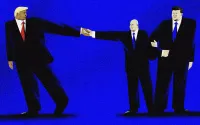by Phyllis Bennis; October 15, 2002
Haven't we been here before? Washington bribing and threatening the United Nations, punishing countries which refuse to toe the U.S. line in the Security Council?
It's all just too familiar. In early 1998, at another moment when the U.S. was gearing up for war against Iraq, UN Secretary General Kofi Annan went to Baghdad, and negotiated a last-minute agreement with Iraqi leader Saddam Hussein. The agreement was designed to resolve problems with the arms inspections and to stave off the threat of a U.S. war. When Annan came back to New York, the Security Council crafted a new resolution endorsing his agreement. U.S. Ambassador Bill Richardson demanded that the resolution call for "severest consequences" if Iraq should violate the agreement in the future; under pressure, the Council agreed. The Clinton administration still wasn't happy. They were all geared up for war, and the resolution meant they would have to recall the bombers and fighter jets and troops.
But there was a serious disagreement over just what "severest consequences" meant. The Russian ambassador even coined a new word -- "automaticity" -- to describe what the phrase did not mean. "Severest consequences," virtually the entire Security Council had decided, did not give any state the automatic right to move on its own against Iraq. Like earlier resolutions, this one ended with the statement that the Council "remained seized" of the issue. In UN diplo-speak, that phrase always means the issue remains on the Council's agenda, and under Council authority.
So on 2 March 1998, after the resolution passed, the parade of Council ambassadors came out of the Council chamber, one by one, to warn explicitly that their resolution did not include "automaticity." It did not, they said, authorize any country -- including the United States -- to launch a unilateral military strike against Iraq. Bill Richardson came last. When Richardson followed his fellow ambassadors out of the chamber to face the cameras, he blithely dismissed his predecessors' insistence that the resolution did not authorize a military strike. He simply shrugged and told the press, "we think it does." Months later, with no authorization by the UN, the unilateral four-day U.S.-UK mini-war of bombs and cruise missiles known as Desert Fox, devastated Iraq.
We're seeing it again now. "Automaticity" has become an official part of the lexicon of UN jargon, and again Council ambassadors are asserting strongly that "there is no automaticity" in the new [probably two-part] resolution the council is likely to pass. But once again the diplomats of the Bush administration, like their Clinton-era predecessors, disagree with the rest of the Security Council, and it seems they still "think it does."
In the next several days it is likely that the U.S. will force a vote in the Security Council for a resolution that the Bush administration will later claim authorizes their war. Other Council members, perhaps most, will claim that the resolution authorizes no such thing. But they will likely do nothing to stop Washington's war.
What will the resolution look like? It will probably take the form preferred by the French -- that is, a two-part resolution. But the substance will be all American. In fact, it is likely that the U.S. will claim that acceptance of the two-part arrangement is such a huge concession that there should be no further objections to anything the U.S. wants to include.
The first part will use strong language outlining a new set of inspection requirements Iraq must meet. It will threaten unspecified "consequences" for any violation or any failure to comply with sufficient alacrity. It may even follow the language of the March 1998 resolution in threatening "severest consequences." Those consequences will not be explicitly spelled out, and the resolution might even include a reference to the Security Council meeting again if the slightest problem occurs regarding Iraqi compliance.
The U.S. will try to get all of its new conditions for the inspections into the first part of the bifurcated resolution. They will almost certainly succeed. What will be spelled out will be far beyond insuring that Iraq allow immediate access to the eight so-called "presidential sites," which under existing UN-Iraq agreements were indeed available for inspection but with certain special arrangements including the presence of international diplomats as well as advance notice. The new resolution will certainly impose punishing, humiliating conditions for inspections; it will likely include some that are designed specifically to increase the chances of Iraqi rejection even before inspectors arrive in Baghdad.
It is likely that the first part of a two-part resolution will include the conditions put forward in the earlier U.S.-UK draft resolution. One requirement will be Iraqi acquiescence to the inspectors taking any scientists -- or anyone else -- they wish to interview out of Iraq altogether, along with their families. The effect would be to have UN arms inspectors acting as asylum officers. Certainly many, perhaps most scientists would jump at the opportunity right now to leave Iraq with their families and be granted asylum somewhere else. They are living, after all, in a country not only devastated by 12 years of crippling economic sanctions and the ravages of a repressive political regime, but also facing the likely possibility of imminent war. There are certainly legitimate reasons why Iraqi scientists would want to live and work somewhere with greater safety and political freedom. There is also, however, the consequent and understandable likelihood of scientists exaggerating the level of Iraq's military or WMD programs as well as their own role in those programs, in the hope of persuading international immigration officials of their importance. And finally, another longer term result of such an effort, if carried out on a large scale, will be the stripping of a key component of Iraq's national intellectual and scientific base, with seriously deleterious effects on future efforts to rebuild a modern society.
The language proposed by the Bush administration would allow representatives of any of the five permanent members of the Security Council to participate in any inspections they choose. That would essentially vitiate the distinction between the current inspection team, UNMOVIC, deliberately made up of UN-employed technical specialists, and its predecessor (UNSCOM) whose inspectors were seconded from national (largely U.S. and British) militaries and intelligence agencies. UNSCOM's credibility was completely undermined when it was discovered, in the summer of 1998 (and reported in the New York Times and elsewhere in June 1999), that U.S. spy agencies had used the UN inspection team to obtain intelligence information having nothing to do with Iraq's weapons of mass destruction but everything to do with identifying and locating Iraqi targets for future U.S. attacks. When UNMOVIC was created, it was specifically required to employ UN international civil servants as inspectors, largely to distinguish it from the discredited UNSCOM model of U.S.-British control. Hans Blix, the UNMOVIC director, staked out a clear position for his first two years defending the need for his inspectors to be accountable to the United Nations as a whole -- not to the U.S. Air Force or the CIA or any other national agency. The new demand undermines that UN accountability, turning UNMOVIC into an unchanged incarnation of its spy-based predecessor.
If Washington gets its way in the Council, the resolution will also require Iraq to accept military escorts -- UN Blue Helmets or from member states -- for the inspectors, blanketing the country with unlimited numbers of UN or even U.S. troops. That means armed forces prepared to use their weapons against any Iraqi -- official or otherwise -- who so much as blinks. According to the language of the original U.S. draft resolution, the inspectors shall "be provided regional bases and operating bases throughout Iraq." They "shall be accompanied at the bases by sufficient UN security forces; shall have the right to declare for the purposes of this resolution no-fly/no-drive zones, exclusion zones, and/or ground- and air-transit corridors, which shall be enforced by UN security forces or by member-states; [and] shall have the free and unrestricted use and landing of fixed and rotary winged aircraft, including unmanned reconnaissance vehicles." That right to establish bases anywhere in Iraq the inspectors (or their military escorts) wish; their right to block Iraqis' access to whatever "exclusion zones" they wish; the right to establish no-drive, no-fly zones and create special UNMOVIC-only transit roads -- all serve to collapse the distinction between inspection and invasion/occupation. And we've been there before, too. Back in 1999, just before the U.S.-NATO bombing began during the Kosovo crisis, there was a "last-ditch" diplomatic effort at Rambuillet Palace in France. When it collapsed, we were told that the Serbs had rejected a perfectly reasonable international demand, and therefore made inevitable, even obligatory, the war that followed. What we were not told, what we only learned weeks later when the real story of the initially secret Appendix B broke in the German press, was that the Rambuillet accord, which was presented in take-it-or-leave-it terms to the Serb side, was designed to insure Serb rejection. Going way beyond the stated concern about Serb conduct in Kosovo, the accord would have required that "NATO personnel shall enjoy... free and unrestricted passage and unimpeded access throughout the FRY [Federal Republic of Yugoslavia] including associated airspace and territorial waters."
Sound familiar? In both cases the official rationales for international intervention -- Serb human rights violations in Kosovo, Iraq's WMD programs --were, however legitimate in their own right, used as pretexts to impose an international military occupation. And that includes the attendant military control of the entire nation's ground, air and space in the name of human rights in Kosovo or disarmament in Iraq. In Rambuillet the Clinton administration deliberately set the bar so high that the Serb side refused to sign. It appears the Bush administration is hoping the Iraqis will follow suit.
Once the new resolution is passed, one of two things will happen. It is certainly possible that the Iraqi government, despite reiterating their intention to allow "unfettered inspections," will be so angered by the U.S. moving the goalposts of the arms inspection, that it will simply refuse to bring the inspectors back under the new terms, or will try to renegotiate the terms while allowing them in. The Council, at U.S. insistence, may well refuse to allow the inspectors to go to Iraq at all under the latter circumstances.
Or, Iraq will acquiesce to the new demands. Baghdad may decide to accept the condition regarding interviewing scientists "anywhere" UNMOVIC wishes, and is likely to accept the more intrusive arrangements regarding the presidential sites. If it does, inspections may get underway. But the chances of Iraq accepting a de facto military occupation in the guise of an inspection regime, and the chances of such "coercive inspections" functioning efficiently and professionally to carry out their disarmament tasks, seem slim.
Either way, it is clear that the Bush administration will make its decision on whether to go to war in utter disregard of the first resolution's lack of actual authorization for war, and quite likely with little regard for any actual progress of inspections in Iraq. The resolution will undoubtedly end with the phrase "the Security Council remains seized of the issue," meaning it remains on the Council agenda. It will also not grant any country, including the United States, the right to determine unilaterally when and if Iraq is in compliance with, or in material breach of, the resolution's terms. But U.S. officials have already indicated they intend to assert that the first resolution provides all the UN authorization they need -- that is to say, none -- to launch their war.
Tragically, it appears that all fourteen other Council members (or 13 if Tony Blair, against the massive opposition of the British people, allies the UK with his Bush buddies) are prepared to simply assert that they do not believe the resolution authorizes force, and then essentially "agree to disagree" with Washington. None, so far, unless France or Russia suddenly recovers their independence, are likely even to vote no, let alone mobilizing a serious international coalition to oppose Washington's war. China may abstain, as perhaps Syria might. But there is no indication of serious opposition; the Council is collapsing under U.S. pressure. It appears every country on the Council has made the same pragmatic determination that if the U.S. goes to war, we want to be part of it. The thinking seems to be that being excluded from an illegal preemptive war, what Congressman Jim McDermott called "a war for oil, power and the blandishments of empire," is somehow worse than endorsing or participating in an illegal, preemptive war of oil, power and the blandishments of empire.
We have been there before too. In 1990, in the run-up to Desert Storm, George Bush Senior bribed and threatened and punished virtually every country on the Security Council to force them to vote to authorize the U.S. war. The U.S. bribed poor countries with cheap Saudi oil. Washington dangled new arms packages before governments such as Ethiopia and Colombia whose access to U.S. military support had been cut because of wars and human rights violations. U.S. diplomats went to China and said "name your price" to avert a veto -- and fulfilled Beijing's wish list for post-Tienanmen Square diplomatic rehabilitation (with announcement of a White House visit by the Chinese foreign minister) and new development aid (in the form of a $114 million World Bank assistance package).
And when the ambassador from Yemen, the only Arab country on the Council, voted against the U.S. war, there was a U.S. diplomat at his side in seconds, saying "that will be the most expensive 'no' vote you ever cast." And then Washington punished Yemen, poorest country in the Arab world, with a cut-off of the entire $70 million U.S. aid package.
Many at the United Nations remember the "Yemen precedent" even today. It may be at the heart of international reluctance to challenge Bush's war. This is an era of a single super-power, more powerful in military, economic, political, technological, diplomatic, and cultural influence than any empire throughout history. In this era, when the leader of that super-power has announced that any country not "with us" is to be considered "with the terrorists" -- what country is prepared to risk standing defiant of U.S. demands?
Certainly many things have changed between 1991, 1998 and today. Perhaps the most significant changes have to do less to do with what the Bush administration is doing, than with how it justifies its actions. In 1991 Bush Senior never claimed the U.S. goal was "regime change" in Iraq; today the assassination or overthrow of the Iraqi leader is stated policy. Never before has the U.S. officially claimed the right to launch a preemptive strike; today, that "right" is at the center of a new doctrine, one which even Henry Kissinger acknowledged stands in violation of international law. (Of course Kissinger went on to claim that therefore what we need is not the repudiation of such illegal preemptive strikes but a full rewrite of international law, to create a new legality authorizing precisely such actions for the U.S. alone.) And never before has the U.S. openly threatened to "go it alone," to invade another country in the name of enforcing UN resolutions even if the United Nations explicitly disavowed such a military attack. Today the UN stands in fear of losing "relevance" in Washington.
The option of a clear "no" position, rejecting the U.S. consensus, standing publicly against such a catastrophic war, and trying to prevent the war or at least distinguishing one's own country from such global folly, does not yet appear on any Security Council member's agenda. And yet exactly that position is urgently required. Demonstrating how the U.S. is isolated from the rest of the world, publicly debunking the myth that Washington is leading an international coalition, would place any critical government on the side of the clear global majority position opposing this war.
At this moment the member states -- especially those serving in the Security Council -- are on the verge of losing their independence of action. Council members may not be able to prevent the U.S. from launching its war. But they can prevent the U.S. from claiming a multilateral UN credential when it does so. They can insure that the United Nations does not, by endorsing this war, violate its own Charter, which prohibits the use of force unless all possible non-military options have been exhausted. It is possible that France will maintain its independence and remain committed to opposing a preemptive U.S. war. Paris could refuse to accept the initial U.S.-UK resolution (even if it is based on the two-part structure France demanded), and may veto the inevitable second resolution explicitly authorizing war. But this scenario appears unlikely.
Rather, if the Security Council fails, this is a moment for other agencies of the United Nations to step forward. This is a time for the General Assembly, perhaps under the sponsorship of the Non-Aligned countries operating as the Group of 77, to take the lead. Relying on the "Uniting for Peace" precedent at the United Nations, the Assembly can seize the initiative as the most democratic organ of the UN to assert its voice in the name of global humanity to challenge the legitimacy of Bush's war.
This is also a defining moment for the United Nations, in which the UN itself as an institution must choose how it defines its relevance on the world stage. Those of the UN system who seek "relevance" only in relation to Washington's narrowly-defined power will seek participation in, rather than challenging the legitimacy of, the U.S. war. They believe that being sidelined by the U.S. represents the greatest threat to the United Nations. And indeed, their participation (however negligible) and their endorsement (however reluctant), will very likely guarantee that officially they are not marginalized, not excluded by Washington. However much they may quietly deplore the undermining of the United Nations, the violations of international law, the breaching of the UN Charter, all inherent in this unilateral U.S. war, they seem prepared to acquiesce to war, to guard against exclusion from Washington's war tent.
The tactic may work; it may prevent the United Nations from being dismissed as "irrelevant" by Washington opinion-makers. But those UN officials take a different risk-- that of losing their ability to speak on behalf of those disempowered voices that make up the 94% of the world's people who do not live in the United States. Those who serve at the center of the UN system have an obligation as international civil servants to implement the UN Charter -- especially its fundamental mission of "saving succeeding generations from the scourge of war." Their work is to protect the peace, however difficult that task -- through negotiations, fact-finding, inspecting, shaming, reporting -- even if it means challenging the will of the most powerful UN member state. Regardless of concerns of "relevance," they must not become champions of war.
Others in the UN system, who define relevance in global terms not limited to the Washington beltway, will take a different decision. Those UN leaders will stand defiant of the U.S. They will speak out against the violations of international law, the undermining of the United Nations, the breaching of the UN Charter, that are all inherent in the launching of a preemptive war. They may not have the power to stop the war alone. But they will give voice to those around the world who have no other voice, whose governmental or civil society voices have been stifled by fear of U.S. power, retaliation, or the Yemen precedent, and who look to the United Nations as the voice of the global conscience. They will speak out to defend the role of the United Nations as a check on all violations of international law, UN resolutions and the UN Charter -- whether rooted in Iraq's unfulfilled disarmament obligations or in Washington's preemptive war -- even if the global organization cannot be a contending power in its own right. Their voices will protect the real relevance of the global organization as it acts on behalf of "the peoples of the United Nations."
http://www.zmag.org/content/print_article.cfm?itemID=2481§ionID=40






